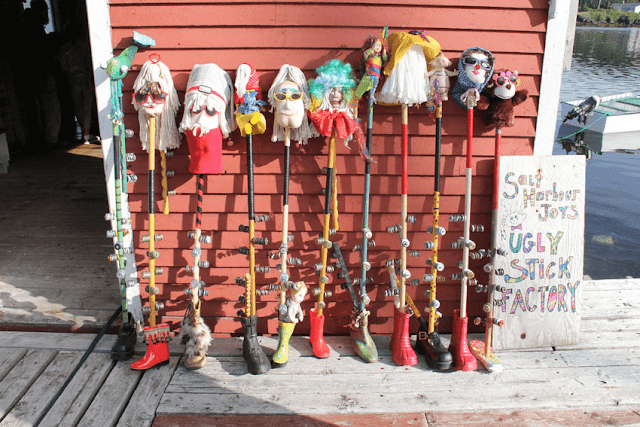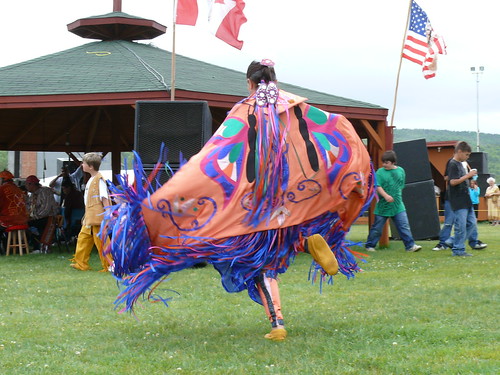Early in 2010 the ICH office held a workshop on Festivals & Folklife in Cupids. One of our participants was Yvonne Fontaine, the Development Co-ordinator for the Southern Avalon Development Association. Yvonne left the workshop full of ideas, went back to Trepassey, and put some of them to good use!
 2010 was Trepassey's Come Home Year, and in celebration of one aspect of local intangible cultural heritage, the organizers planned an Ugly Stick Workshop during the week of the Come Home Year Celebrations. The workshop was held 2:00 PM Thursday July 29th. They provided the beer caps and the juice cans, participants provided the mop (and the decorations of their choice).
2010 was Trepassey's Come Home Year, and in celebration of one aspect of local intangible cultural heritage, the organizers planned an Ugly Stick Workshop during the week of the Come Home Year Celebrations. The workshop was held 2:00 PM Thursday July 29th. They provided the beer caps and the juice cans, participants provided the mop (and the decorations of their choice).Unless you have a time machine, you can't go back to Trepassey for the workshop. Have no fear! Here are our tips for making the ugly stick of your dreams.
7 Steps to a Beautiful Ugly Stick
2. Pre drill holes in your stick where you want to place your beer caps. Space them out, and leave yourself some room so you can grip the stick while you play it.
3. Punch or drill holes in your beer caps. Make the holes a bit larger than your screws, so they rattle.
4. Assemble your beer caps on your screws or bolts, then screw them into the pre-drilled holes on your stick. Five or six per screw is good. You can use a combination of caps and felt tins if you wish; hard-core builders boil their beer caps to remove the rubber lining. The beer caps are the most important thing, that’s what makes your music for you.
5. Attach the bottom of your stick to an old boot. Drill a hole in a piece of wood, put the mop handle into that, and then screw the whole thing into the base of the boot, to give it stability.
6. Add a tin can somewhere to the stick. Try putting a soup can on, lower down, so that way, if there is a point in the music where you bang it, it is like hitting a drum, to get that extra sound to go along with the sound of the beer caps.
7. Decorate your ugly stick! Give it a personality, a face, some hair, a hat. Make it ugly! Once it is done, you are ready to go mummering.
And here is a how-to makers video, from one of our long-time Mummers Festival participants!
https://youtu.be/C8Mgzr-kwnw
Want more help?
The Do-It-Yourself junkies at The Scope can help you make your own:
http://thescope.ca/diy/diy-ugly-stick
There is also a handy free downloadable pdf with instructions right here. You can print it off, and get to work building your own ugly stick.
Ugly Stick on Wikipedia
http://en.wikipedia.org/wiki/Ugly_stick
Mike Maddigan of The Sharecroppers shows how it is played:
http://www.youtube.com/watch?v=CBxZJWnca14
There is also a handy free downloadable pdf with instructions right here. You can print it off, and get to work building your own ugly stick.
Ugly Stick on Wikipedia
http://en.wikipedia.org/wiki/Ugly_stick
Mike Maddigan of The Sharecroppers shows how it is played:
http://www.youtube.com/watch?v=CBxZJWnca14
Send us a picture of your finished ugly stick, and we'll share it in a future post! Email dale@heritagenl.ca




























